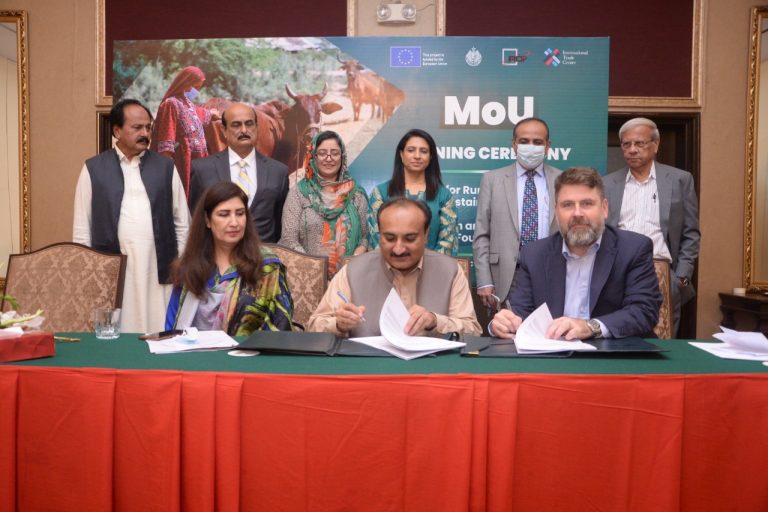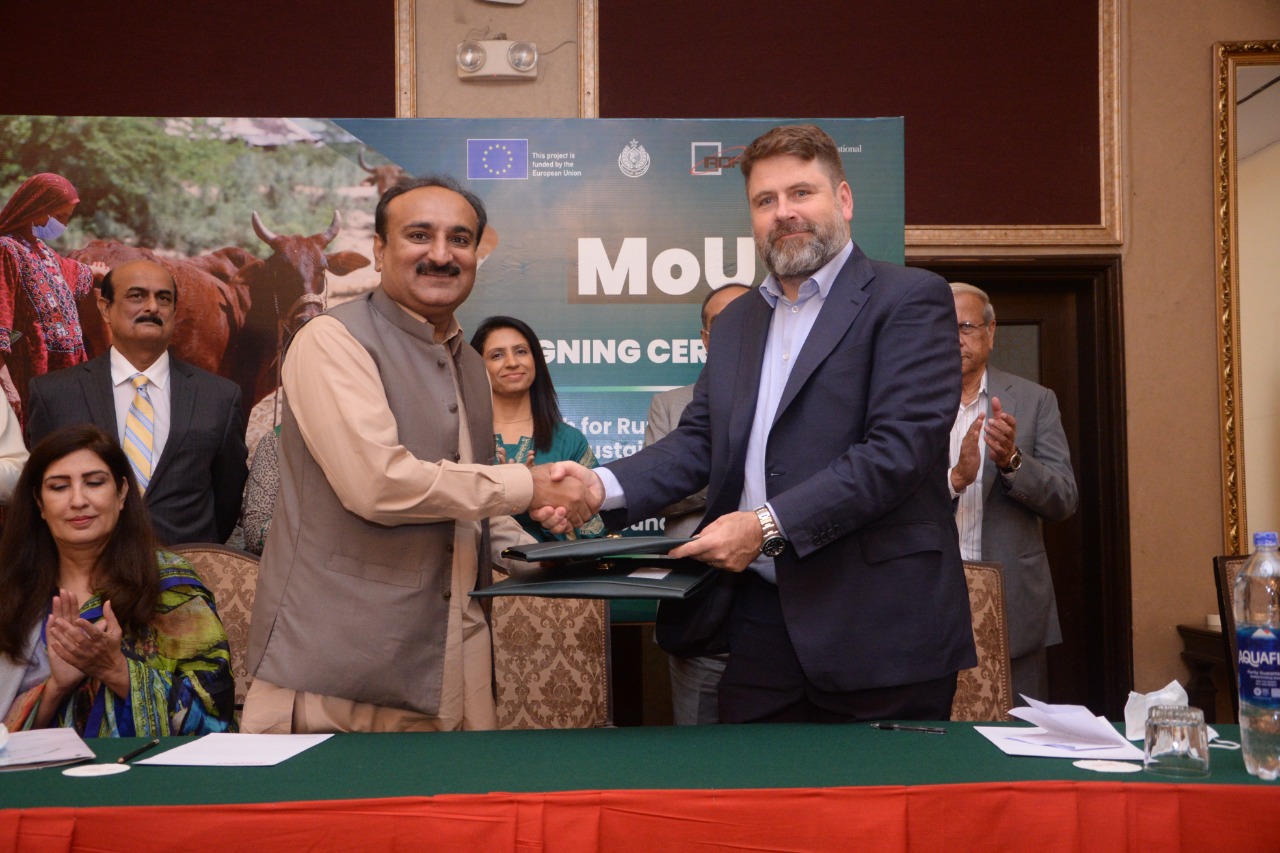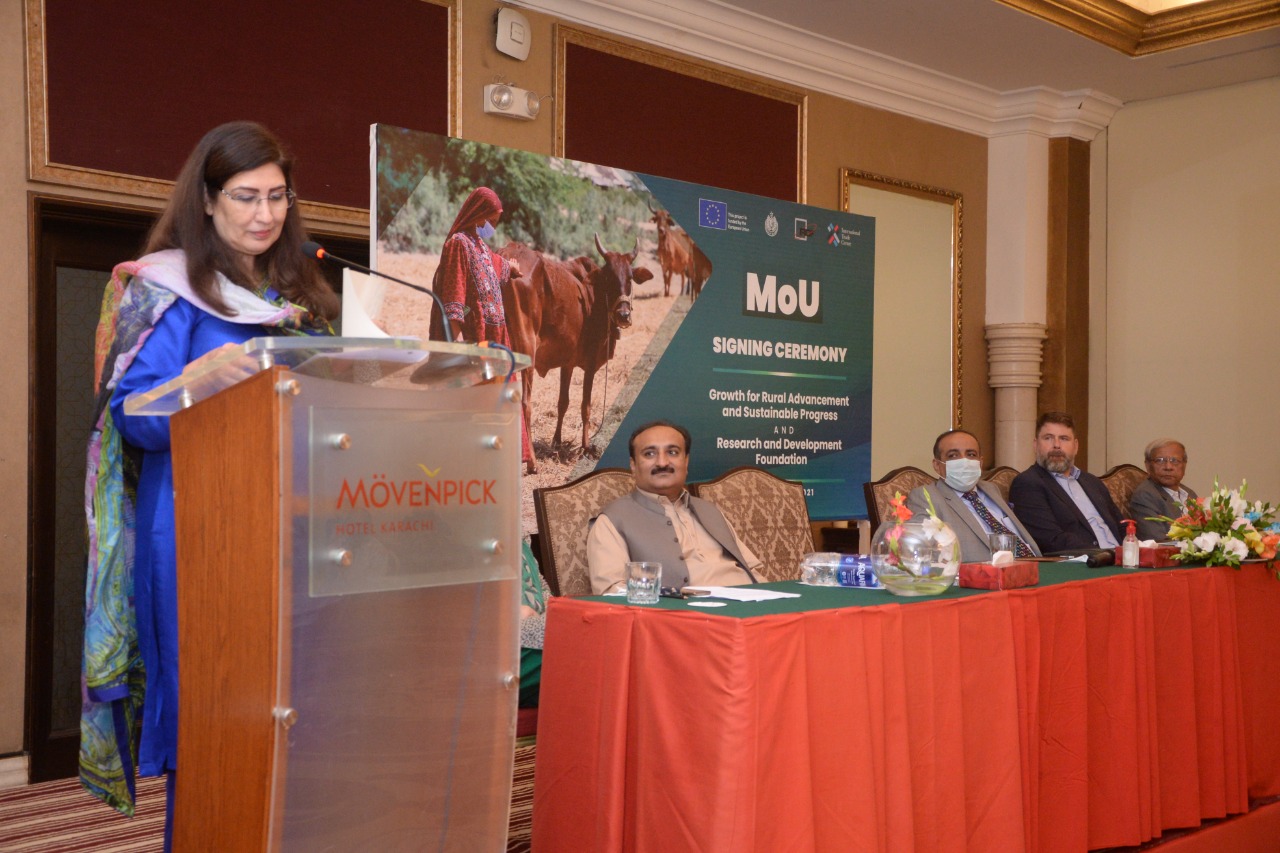
Two organizations – GRASP and RDF joined hands for improving competitiveness of Small and Medium Companies.
Karachi
Marking the International Rural Women’s Day on October 15, 2021, two organizations – Growth for Rural Advancement and Sustainable Progress, a project funded by the European Union and implemented by the International Trade Centre, and Research and Development Foundation (RDF), signed a Memorandum of Understanding (MoU) to work together for uplift of the rural women’s small and medium enterprises (SMEs) to increase business opportunities and employability and eradicate poverty.
Speaking at the MoU signing ceremony, Mr. Robert Skidmore, ITC’s Chief of the Sector and Enterprise Competitiveness highlighted how improving competitiveness of Small and Medium Companies can have broad based socio-economic impact.
 Provincial Lead GRASP-ITC Ms. Shabnam Baloch spoke on removing obstacles women face in agri-business, which GRASP contributes through its initiatives, such as policy review, capacity building program, and exposure visits. “The women are the face of farming, if the obstacles in their way are removed to access and own the land, get connected with the markets and are provided suitable working conditions, they will thrive as agri-business entrepreneurs,” she said.
Provincial Lead GRASP-ITC Ms. Shabnam Baloch spoke on removing obstacles women face in agri-business, which GRASP contributes through its initiatives, such as policy review, capacity building program, and exposure visits. “The women are the face of farming, if the obstacles in their way are removed to access and own the land, get connected with the markets and are provided suitable working conditions, they will thrive as agri-business entrepreneurs,” she said.
Dr. Kaiser Bengali, an economist and policy expert highlighted how entrenched gender roles in Pakistan can create obstacles for women to sell their crops in the market, especially when their mobility is controlled by obsolete cultural practices.
Dr. Fateh Marree, Vice Chancellor of Sindh Agriculture University, Tando Jam elaborated the perspectives of the SAU-GRASP partnership to improving the agri-products value chains with mutual efforts by involving research and policy shift.
Ashfaq Soomro, Head RDF shared RDF’s achievement in GRASP during COVID response, where a large number of women were trained around entrepreneurship, connected with the market, use digital spaces and earn from their work.
 Syeda Shehla Raza, Sindh Minister for Women Development, supported GRASP’s initiatives of linking rural women entrepreneurs to the male-populated markets, and highly appreciated initiative of distributing digital devices to the women entrepreneurs to sell their products.
Syeda Shehla Raza, Sindh Minister for Women Development, supported GRASP’s initiatives of linking rural women entrepreneurs to the male-populated markets, and highly appreciated initiative of distributing digital devices to the women entrepreneurs to sell their products.
Dr. Sahar Gul, Gender Advisor, Sindh hosted the program. The program objective was based on the saying that if we teach a man to farm, his family will eat. If woman is taught farming, whole community will eat. If women farmers have access to the same resources as men farmers have, the entire world will eat.
The theme for the International Day of Rural Women, “Rural Women Cultivating Good Food for All”, highlights the essential role that rural women and girls play in the food systems of the world.
From production of crops to processing, preparing, and distributing foods, women’s labor – paid and unpaid – feeds their families, communities, and the world. Yet, they do not wield equal power with men, and as a result, they earn less income and experience higher food insecurity.
The United Nations’ International Day of Rural Women celebrates and honors women and girls living in rural areas on 15 October each year. It recognizes the huge role that rural mothers, daughters and grandmothers play in producing food, and building agricultural and rural development worldwide.
GRASP is working to help small and medium-sized enterprises in horticulture and livestock become more competitive by making improvements at all levels of the value chain. The project especially focuses on empowering women by bringing them into the conversation, creating jobs and strengthening women’s organizations, by providing producers with targeted services, such as access to market information, credit and training. It also supports firms in processing commodities into value-added goods, adopting better technology and building efficient and inclusive supply chains.
RDF will implement GRASP in increasing capacities of SMEs to add value through compliance with food safety in 12 districts across Sindh and ensure rural women development across selected areas. (PR)
__________________________